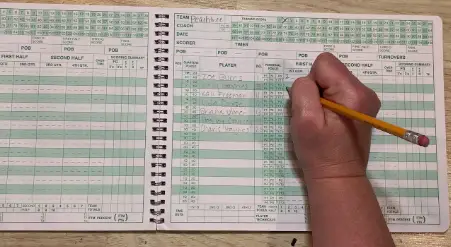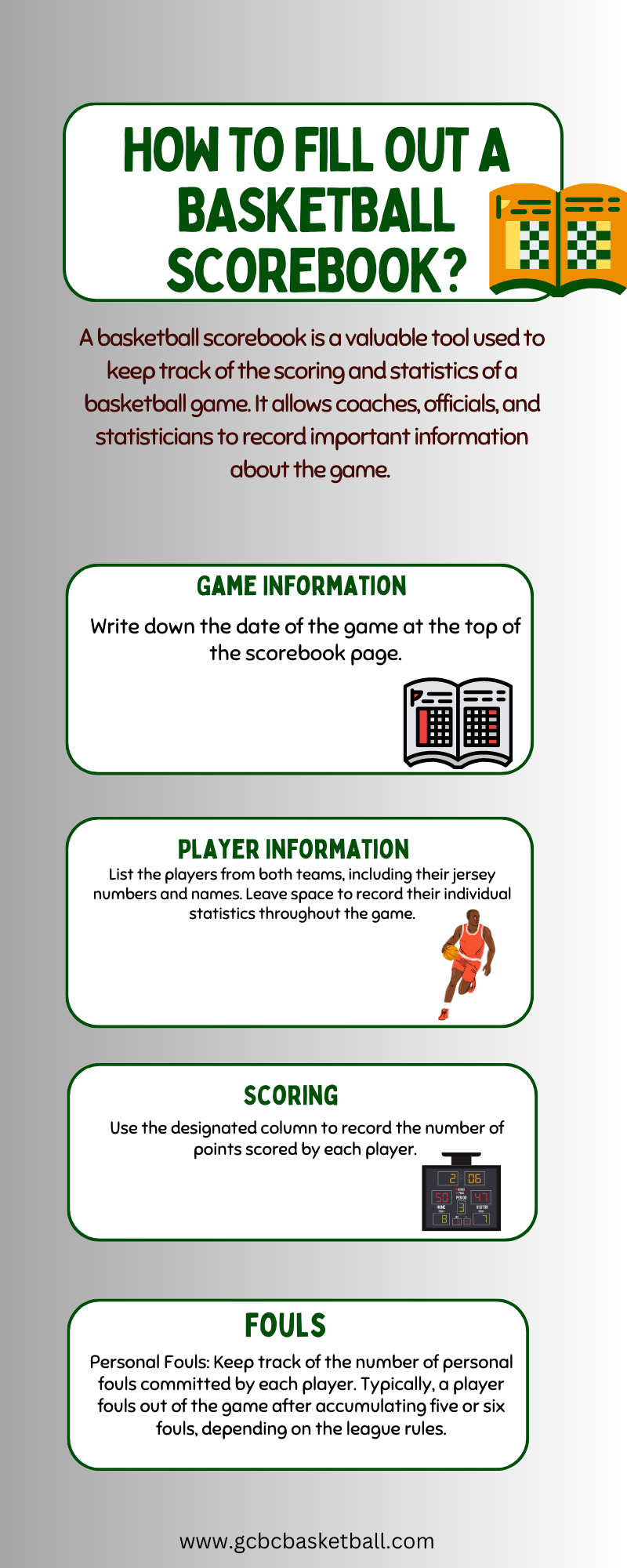Keeping track of a basketball game is an important part of the sport. It provides a record of the events during the match and can also be used to help analyze performance and strategies. A scorebook is an essential tool for plotting and tracking all aspects of the game.
When entering information into a basketball scorebook, each play should be written down chronologically as they occur on the court. This includes points scored, fouls called, timeouts taken, and substitutions made. As well as this, it’s important to note when players make shots from three-pointers or free throws, which will affect stats such as field goal percentage.
Tips On How To Keep Track Of Basketball Scores:
As a coach, you must document your team’s progress by tracking their score history throughout the season.
Write Down The Players’ Names And Numbers:

Start by writing down the players’ names, jersey numbers, and relevant notes, such as positions or special instructions. This will help ensure you have all your information ready when it comes time to track scores, fouls, and other stats during the game. Additionally, ensure you have enough room to note substitutions if they occur mid-game or at halftime.
Mark Possession On A Basketball Stat Sheet:

By tracking each possession, coaches can gain critical insight into their teams’ strategies and performances during games. Marking a change of possession on a basketball stat sheet is fairly simple but requires paying close attention to the action taking place on the court. Every time there’s a made basket or an offensive foul, coaches should mark who has obtained the ball from their opponents. Doing this helps keep track of possessions and how many points have been scored in each quarter or overall in a game.
Keep Track Of Team And Individual Player Points:

Making sure every point is properly accounted for can be time-consuming and sometimes tedious, but it’s also essential to the success of a team or an individual player. Knowing which team or players have scored what points in any given game allows coaches to make strategic adjustments and gives players an idea of how they perform compared to their teammates.
Keep Track Of The Stats:

Keeping track of all the important stats, such as tallying assists, rebounds, steals, blocks, turnovers, and field goal attempts, can be daunting.
By monitoring these various statistics during each game or practice session, teams can identify areas where they excel and need improvement. It also allows coaches to provide feedback tailored to individual players’ needs.
Suppose one player consistently racks up high numbers in rebounds but fails to convert those into points or assists during an offensive drive. In that case, this player may need extra focus on developing shooting and passing skills. Keeping track of all statistics provides an extended view of how much value each team member brings to the court.
Record Technical Fouls:

To accurately record technical fouls in a basketball scorebook, start by writing down the number of players involved and circle it next to their name on the roster page. Then, fill out a separate page devoted to tracking technical fouls; be sure to include information such as type of infraction, time left in the game when it occurred, score at the time of occurrence, and players involved.
Track Time Outs:
To track the time-outs in your basketball scorebook, start by marking down when each team takes one. During each quarter or half, note whether it was used before or after a free throw attempt or upon entering the game. This will help you track how many times out were taken overall and which team used them most often.
Record Substitutions:
Note the number associated with the player entering and exiting. This will help you keep track of each substitution and which players are eligible for free throws at any given time. Additionally, when a player enters for another player due to fouls or other reasons such as injury or fatigue, a record of that information as well so it can be referenced later if necessary.

Conclusion:
Keeping track of a basketball game with a scorebook is essential for any fan or referee. It can be difficult to learn at first, but it becomes easier with practice. Understanding the basics of how the scorebook works and the various elements that go into it are key to mastering this skill. It is important to prepare ahead of time by familiarizing yourself with the rules and regulations for filling out a basketball scorebook.

Clyde Jackson III is a basketball coach and the founder of GCBC Basketball, a basketball-related learning and informational website that focuses on helping young players develop their skills on and off the court. With over 15 years of coaching experience, Clyde has worked with players of all ages and skill levels, from beginners to professionals.














